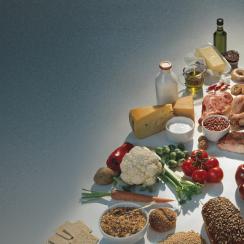Do you suffer from PMS? Try drinking more water and eating more vegetables and fruits. Have a handful of nuts, enrich your diet with salmon, limit desserts and get some exercise! These pointers can help ease your symptoms!
Make your salad dressing healthy with a tablespoon of olive oil. Especially the extra virgin variety for its heart health benefits.Its richness in antioxidants also makes it good for overall health. But remember that 1 tablespoon contains 120 calories, so use it in moderation!
More energy with iron-rich foods everyday! Prevent iron-deficiency anaemia with meat and chicken because of their efficient absorption in the body. Other good sources include legumes such as beans and lentils, and green leafy vegetables such as spinach and parsley.
Vitamin C and Iron go hand in hand! To increase the absorption of iron from green leafy vegetables such as parsley and legumes such as lentils, simply have a vitamin C-rich food with your meal such as fresh orange juice, a squeeze of lemon green pepper, or strawberries.
To enjoy a healthy lifestyle, find the balance between your food intake and your activity level! How? Make healthy food choices as often as you can and try to take part in a sport or an exercise most days of the week.
Brain foods! Make fish, walnuts, berries and other red or orange fruits and vegetables part of your diet. These are loaded with nutrients that help keep your mind healthy and young!
Your health comes first! Taking care of your health and body will reflect positively on your well-being and on your family’s life. Choose healthy meals and snacks, fit some exercise that you like into your life, treat yourself to something you enjoy, like reading a book, and most of all relax!
Decrease saturated fats in your diet for a healthier blood cholesterol level! How? Choose your dairy and meat sources wisely. Opt for low fat or skimmed dairy products, grilled lean red meats, baked or boiled skinless and baked or broiled fish…lean and healthy!
Manage your type-2 Diabetes. Balance these three lifestyle factors – diet, exercise, and medication – in order to control your blood glucose level. Remember to visit your doctor regularly for proper treatment.
Diabetic? 2 ways to keep your blood sugar in check: Avoid consuming sweets and desserts and evenly distribute your carbs, and not any type of carbs but the whole-grain or brown varieties, healthy legumes and fresh fruits, in moderation.
Get healthy eyes with carrots, green vegetables, fish and nuts! Combine them in a plate of baked salmon with steamed spinach, carrots and potatoes on the side, topped with almonds. This dish is packed with eye-health promoting nutrients: vitamins A, C, E, lutein, zeaxanthin, and omega-3 fats.
Soft-cooked eggs or hard-boiled eggs? Definitely well-cooked eggs! If eaten undercooked or raw, you may increase your chances of food poisoning due to the Salmonella bacteria, sometimes present in eggs! Eliminate it by cooking the egg thoroughly!
Eat more of these foods for healthy teeth! Have calcium and phosphorous-rich foods such as milk and dairy for strong teeth. Choose firm and fibrous foods that help clean the teeth and keep your gums healthy such as fruits and vegetables. And don’t forget cheeses that help protect your enamel. (Nestlé Tip on World Oral Health Day)
For a healthier heart, try out the Mediterranean diet! This means more legumes (beans, lentils, peas), fish, fruits, vegetables and olive oil in your diet. These foods help lower cholesterol and have a beneficial effect on heart health in general!
Fruits, vegetables, whole grains and legumes: Enrich your diet with these fiber-rich foods that play a major role in regulating your intestinal function, preventing constipation and bloating.
Have you had your antioxidants today? Colored fruits and vegetables, whole grains, coffee and tea are naturally rich in antioxidants that help protect against cell damage and contribute to overall health and well being.
Vegetarian? Make dairy, eggs or fortified breakfast cereals part of your breakfast to get your vitamin B12 which is not available in any plant food!
Salt? You need just a little. Try not to use the salt shaker at the table; remember that salt is an acquired taste, so you can decrease this habit gradually. Why? To maintain healthy blood pressure and arteries.
Scared that all high-fat foods are bad for your cholesterol? Rest assured that plant foods such as nuts, seeds and vegetable oils are naturally cholesterol-free and contain healthy fats that are good for you, when consumed in moderate amounts!
Can your vegetarian dish give you good-quality protein? Yes! Just mix legumes such as beans or lentils with grains like rice or burghul and you’ll get a complete protein!
A late sleeper? Make sure to get your 7-8 hours of zzz’s! Not only will you feel mentally and physically relaxed, but it will also help you maintain a healthy body weight.
Aiming to increase healthy fibre in your diet? A wise plan, but remember to do it slowly to reduce bloating and gas. Drink plenty of water too, to facilitate its passage through your digestive system.
‘Hydrogenated vegetable oil’ listed in the first few ingredients on the label? don’t take it! This means it has a high amount of Transfat, the type of fat that has a negative effect on health, especially for your heart.
Wondering if you need a multi-vitamin/mineral supplement? If your diet is balanced and varied, you can do without them!








